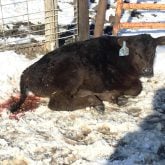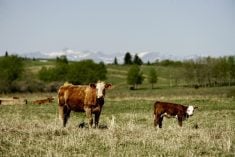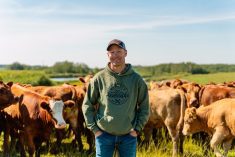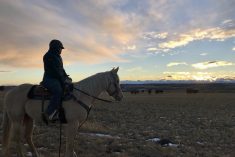Sheldon and Gerry Scheck had two goals in mind when they moved home from Alberta to the Scheck family farm near Cactus Lake, Sask. in 1997. They wanted to raise a family and become organic farmers. Today, with their family of four, they are making a name for their farm, Cactus Organics, by producing quality Highland beef and cereal grains.
The seed of the idea was planted when they were teaching in B.C. in the early 1990s. “We noticed that farmers are popular and respected in B.C. and that organic food was becoming popular,” Scheck says. Though he and Gerry, who was raised on a grain farm near St. Gregor, Sask., had been away from the farm since their high school years, they had the background and the opportunity to get into organic farming on better land and a bigger scale in Saskatchewan.
Read Also

Reintroducing fire to Saskatchewan pastures
Pastures evolve over time. Woody plants and shrubs, which cattle can’t eat, may encroach on natural grasses. Invasive species, such…
Their first quarter of land was certifi ed organic in 2001 and by 2006 they had achieved certification for their entire land base of 2,400 acres. That supplied the organic feed resources to be able to certify the beef herd. It was predominantly a Black Angus commercial herd until they hit on Highland cattle for their target market — farm gate sales of beef to families who want a connection to their food and the people who grow it.
“Food isn’t just about eating anymore. It’s about everybody — producers and consumers — getting involved with each other,” Scheck explains. “With organic grain sales, the market is very volatile and we don’t know the end consumers. That’s not nearly as interesting as when we take beef to a customer and get to know the families who eat and enjoy our food. We do have many repeat customers and that’s very satisfying.”
This emerging consumer trend is mirrored in the restaurant trade as people want to know where and how their food was raised when they dine out as well. For the past two years, Cactus Organics has been the supplier of beef to the Saskatoon Club, an historic, top-end restaurant and meeting venue in downtown Saskatoon for business, professional and community leaders. Chef Anthony purchases whole beef parted into sections, picks up about 200 pounds at a time from the Schecks’ storage facility in the city, and cuts it to his own specs for his delectable entrées.
Though Cactus Organics hasn’t matured to the point where they can make a living off farming alone, in light of today’s consumer trends they are confident that time will now come sooner than later.
Proximity to large urban centres is often viewed as necessary to successful farm-direct sales. Cactus Organics’ experience is proof that producers can successfully sell beef in rural areas, too. The farm is located near Macklin, just inside the Saskatchewan-Alberta border. There are still many good-sized communities in the region, however, the nearest cities — Lloydminster, North Battleford and Saskatoon — are at least an hour and a half away.
There’s no trick to successful marketing, Scheck says. You just have to connect with your communities. They make time to participate in community activities, volunteer at events and belong to organic groups and local food groups. People will get to know you and that you have a good product, he says.
PRODUCING THE TASTE OF SUCCESS
The demand for their beef has kept them sold out for the past two years and they have been fielding enquiries from other restaurants. That has brought them to a critical point in their farm business plan. As it stands, their Highland breeding herd of 45 animals makes use of land that is the least productive for growing grain. They will have to start converting grain land to forages if they want to expand beyond about 50 cows.
“We’re holding tight for right now. We want to secure solid markets up front, then expand the organic beef side,” he explains. The goal is to build up to the point where the production cycle — beef, forages and grain — is one intertwined, self-sufficient loop with beef being the ultimate end product that leaves the farm.
At today’s price of $2.85 per pound dressed weight plus cutting and wrapping for their Highland beef, they figure they would need to sell about 500finished animals each year to make a living from selling beef alone.
The restaurant beef is processed at the provincially inspected Diamond 7 plant in Lloydminster. It doesn’t have organic certification, which means that even though their beef is raised organically, it loses its organic certifi- cation when it is processed. The good news is that the plant is currently working toward organic certification.
The lack of a government-inspected organic meat processing facility in Saskatchewan has definitely been a problem for the province’s organic livestock sector.
The remainder of their beef is processed in the small butcher shop they’ve had on the farm since 1975. They have hired a local butcher to handle the on-farm processing after Sheldon’s dad retired. The advantage of having the shop on the farm is that they have been able to do a lot of taste testing through the years and, in turn, gain a greater understanding of how to produce the taste that keeps their customers coming back for more.
“The taste of the beef from Highland cattle is much more flavourful and the cuts are smaller than typical,” Scheck says. They marble well, but lay down very little external fat because they have two coats of hair to keep them warm. The lean meat yield as a percentage of the whole carcass is also high because of the small bone size.
Mature cows weigh about 1,000 pounds and the calves weigh about 500 pounds at weaning. They are grown out slowly on free-choice whole hay and whole or rolled barley grain from self-feeders, finishing at approximately1,000 pounds by 24 months of age.
That does have implications for pricing, he says. There’s a bit of a premium because they are raised organically and another because of the long production cycle to achieve the desired end product. The price is definitely a consideration for customers, particularly restaurant owners if they feel that their own customers aren’t quite ready for that price point.
Considering the growing popularity of grass-fed beef, they have also been questioned about why they feed grain to their cattle. Taste has a lot to do with it, Scheck explains. The cattle like the taste of grain and they and their customers like the taste of grain-fed beef. Weather is another consideration. Grain is a high-quality, protein-rich, energy-packed supplement they grow right on their own farm. A little goes a long way to keep cattle warm and growing during the cold winter months. Perhaps most important in the big scheme of things is their goal of making a good living from their organic land base by growing grain, forages and cattle to achieve self-sufficiency.
Visit Cactus Organics’ new website and their online butcher shop at www.saskatchewanorganic.com or contact the Schecks at 306-372-4950 or [email protected].
———
DINE WITH A STAR
The Schecks, along with organic vegetable growers Steve and Jan Guenter, were the guest producers at the lead event for the “Dine with a Star” series — a unique evening of “edu-tainment” and an upcoming reality television show that is part of the Saskatchewan Organic Directorate’s Food Miles campaign to encourage consumers to purchase locally-grown food.
Each “Dine with a Star” evening is being filmed as guests enjoy a gourmet organic meal prepared with local ingredients and plenty of good conversation with the guest chef, guest Saskatchewan celebrity and guest producers who have contributed their finest, says event co-ordinator Marion McBride. Many of the evenings will include entertainment by the hosting Saskatchewan star. Seating is limited and proceeds from the $100 ticket price will be donated to community-based organizations that support the Saskatchewan organic industry.
The first evening was hosted by the Saskatoon Club with Chef Anthony and guest celebrity Saskatoon mayor Don Atchison. The menu featured seven courses, one of which was Cactus organic tenderloin of beef served with Whitefox golden chanterelle mushrooms and fresh organic potatoes and vegetables, with fruit wine pairings for six courses supplied by Sue Echlin of Living Sky Winery.
“We were blown away by the flavour of the food and, as mayor Atchison pointed out, the salt and pepper shakers were still sitting in their places having not been touched as the flavour of the foods was so incredible,” McBride comments. “Conversation centred around the need to have healthful food for us to stay healthy as attested to by the mayor, whose wife is a cancer survivor and now a regular shopper at the Saskatoon Farmer’s Market.”
Guests were curious about the use of alternative breeds of cattle as well as Bedard Creek Acres’ syrups in the sauces and the hemp hearts and oil from Caledonia Organic Farm in the various courses, McBride adds. Discussion about the potatoes led to the interesting fact that certain varieties are better suited than others for specifiuses in cooking. The flavour of Guenters’ potatoes paired with the Schecks’ beef was a great combination.
The 13 “Dine with a Star” evenings will run from October 25 through January at well-known restaurants in Saskatoon, Regina, Prince Albert, Wolseley and Birch Hills. Footage of the farms and food preparation will round out the 60-minute episodes of the 13-part series to air in the new year on a Saskatchewan television station.
Visit www.saskorganic.com to find details about the events as they are added to the schedule and for a directory of all restaurants in the province that serve organic or local food.
















